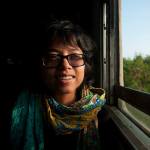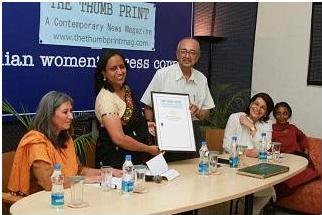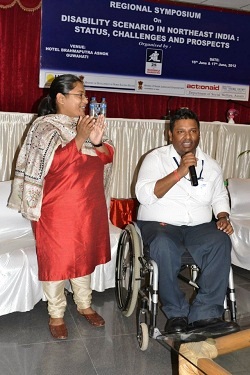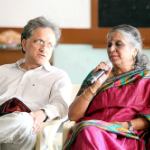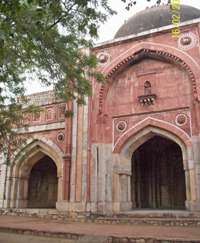As the crow flies, Hanoi is closer to Guwahati than New Delhi, is a popular paraphrase used to describe the Northeast region of India. The similarities of ethnicity and culture summarized in the phrase dates back to pre-historic times, albeit in post-Indian-Independence modern times, the boundaries of nationhood severed many relationships of social, political, and economic interactions. Of late, though, as neo free market economic designs reach the remotest corners of the world, the possibilities of reinventing these ties are being talked of. In a different tone and scale.
In recent years the number of Northeasterners visiting Bangkok has increased rapidly. Bangkok and Pattaya now is popular not just for its "ill-famous" touristic attractions but also for developing business ties. There are Assamese architects who have collaborated with firms in Bangkok to be part of the construction boom that seems to have hit every developing country. There are traditional theatre, music, art, and dance groups from Manipur and Assam who are visiting on exchange programs. There are students from all over Northeast in educational institutes like the Asian Institute of Technology. There are also business partnership in the agro-business, education and such sectors.
During my stay in Bangkok, I bumped into a few people from the Northeast. Quite predictably there is also an Assamese Association in Bangkok. They have a membership of 25 people. I was told they quite like it here. People are friendly and many a time because of their similar looks they receive extra attention. Communication however is a problem. Thai people receive education in Thai and not many people can speak English to communicate. For touristic business transactions people do speak a few basic sentences, but exchanges feelings thereafter is difficult.
This complexity of looks and language was experienced firsthand when my South African black friend and I entered a shop in Platinum Plaza, another temple for the cheap-shopping religious. I asked, "How much are these pants for?" The old lady looked at me with scorn and with obvious rudeness replied something in Thai. My South African friend was taken aback. "How come," she asked me, "why was she rude to you? Thais are otherwise very friendly people. I have never seen anyone being so rude."
I smile in understanding. I have faced this many a time in the Northeast too, and a few times in Thailand. They think I am Thai and I am being fancy by speaking to them in English. Usually the more tourist-friendly young lot grab at my first English sentence and say, "Where you from? O, from India! But you look Thai!" From older people, I get scorn and rebuff - in Thai. Sigh! The ethnic existence!
That many people of Northeast have many ethnic connections with people of Southeast Asia is known to some in the Northeast. In the recent past the Tai-Ahom community of Assam has made attempts to reconnect with their blood cousins in Thailand. In 2009, the Thai princess made a visit to Assam. The event received widespread coverage in local and national media.
The connections are not so well known in this part of the world. They however are there.
At an event (call it a party) organized by the Rotary Club of Mae Sot, an industrial town on the border of Thailand and Burma, I had to say a few words. Trying to appease the local crowd I mentioned that where I come from is 'walk-able' distance from Mae Sot if you take a shortcut through Burma. And that I feel very much at home in Thailand. I was surprised to hear the word Tai-Ahom while the translator translated what I said to the crowd. I had not said anything about Tai-Ahom. A very warm response passed through the crowd. A few people dragged me to their side and started asking me questions: Do you speak Thai? Do your parents? Do your grandparents speak? I felt I was disappointing people with my answers in the negative. I apologized for something I had not done, with no idea what it was. Only later, when I get hold of the translator, I got to know that she had said that I was Tai-Ahom. And Tai-Ahom in the Thai language means "people of our origin".
They know that they have blood cousins somewhere. They do not know about Assam, Northeast or that India has a place like this. Sounds familiar?
Well, unfortunately the familiarity ends shortly. By culture if we mean clothes, food or religious rituals: yes, there are many things similar between Thailand and my land. Anthropologically, there is much similarity between the people and their history. But if we understand culture to be the current living practices and ways of people, then there are no similarities; in fact there are some very basic differences between this land and that.
Take Bangkok city for example. Both in terms of size and population it is a city ten times bigger than Guwahati. In terms of organization, cleanliness and comfort it is 100 times better. Logically and logistically speaking a smaller city with fewer tourists should be easier to maintain, no? Apparently not. Bangkok as a city is so clean, so organized that it takes me by surprise every time. Living in India has made me get used to the idea of things not working so much so that when in a place things actually work it surprises me.
Just the other day I had to get to the railway station. I had to buy a train ticket to go to Vientaiane, Laos. I dreaded the errand and procrastinated for many days. I imagined having to sit through bad traffic for hours to get to the station. I imagined long queues where people stand too close to you. I imagined there would be no tickets available. I imagined officials who would humiliate me for having dared to buy a train ticket to somewhere - stuff every middle-class Indian student's long-distance vacation nightmares are made of.
One bad thing about procrastination is that it never gets thing done. Four days before my imagined date of departure the other self of mine told me to get to the station then or there will be no Vientiane. I braced myself, asked for my mother's blessings in my heart (in reality she will never hear it) and got out of my temporary comfort zone - the university res.
Two minutes into the stoppage a taxi came and agreed to take me to Hua Lampong station. No bargaining, no discussions. Ten minutes later I was at the station. There were greeters for tourists at the gate who told me where I needed to go. The smiling boy told me to go to the information counter and pointed it out to me, clearly visible from the entrance. At the information counter a young girl and an elderly man smiled and told me that seats were available and that I should go to counter 16. At counter 16 there were two people before me. I waited behind them and seeing this the lady at counter 15, who had a sign saying "Counter Closed", removed the sign and called me to her counter. I told her the dates and the place. She turned the keyboard towards me and said, "Type your name please." I typed my name and paid the money. I had only big notes and was waiting to be scolded or at least shown some displeasure. I instead got the change back with a smile and a "have a nice journey, madam". I sat in a taxi and ran the entire thing in my head again. I looked at the time and realized it had taken me all of 25 minutes. Five minutes later I was back at the res and still not believing this had actually happened.
This was possible!
They smile at everyone no matter what they are doing. This reminds me of home sometimes. When I live in India and would visit home for vacations, the first thing I would do is reach Shillong. Once in Shillong, people smile at you. You walk into a shop, people smile at you. Catch a taxi and he will smile at you. It takes some getting used to this politeness. In the beginning I always asked myself why they were smiling: did they want to take advantage of me? But in a few days I would get used to it and dreaded getting back home.
This however is getting less and less frequent. Guwahati is like every Indian city where what you expect at every step of your daily life is hostility. Smiling is rare and tones are harsh. It is a war that you need to win at every interaction. Every interaction is business. Sometimes I wonder if would we have turned out this way had the colonizers (the new and the old ones) not got us.
Talking about colonization, Thailand prides itself on being the only country in the region that has not been colonized. Apparently, they are very westernized. The kings Rama V and VI in their attempt to modernize the country and take the nation forward had started universities, banned chewing of betel nuts, made it compulsory for women to wear short skirts instead of the longer wrappers, and use spoon and fork instead of hands. The king being the highest institution and the people being rather fond of their king, Thai society transformed. Naturally there are more complexities in the society than giving up on Mahk (betel nut) for the king. But I put down my shredding fork for now.
As Buddhism says, there is good and bad in everyone. Being in Bangkok makes me wish some of the good things I could take home. Every time I enjoy the benefits of a well organized place, I think about folks back home. How many people even know that it is possible to have properly functioning infrastructure if we change a little bit inside?
I end in hope.

